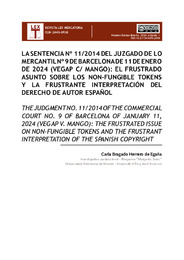Por favor, use este identificador para citar o enlazar este ítem:
https://hdl.handle.net/11000/32505Registro completo de metadatos
| Campo DC | Valor | Lengua/Idioma |
|---|---|---|
| dc.contributor.author | Bragado Herrero de Egaña, Carla | - |
| dc.contributor.other | Departamentos de la UMH::Ciencia Jurídica | es_ES |
| dc.date.accessioned | 2024-07-17T10:06:26Z | - |
| dc.date.available | 2024-07-17T10:06:26Z | - |
| dc.date.created | 2024-07-11 | - |
| dc.identifier.citation | Revista Lex Mercatoria, Número Extraordinario, 2024. Artículo 1 | es_ES |
| dc.identifier.issn | 2445-0936 | - |
| dc.identifier.uri | https://hdl.handle.net/11000/32505 | - |
| dc.description.abstract | Es hasta cierto punto inevitable que cada innovación tecnológica que propicia nuevos usos de las obras y prestaciones protegidas suscite el planteamiento de nuevas cuestiones jurídicas relacionadas con el derecho de propiedad intelectual. El caso de los non-fungible tokens no escapa a esta tendencia, y el asunto VEGAP c/MANGO pareció constituir la ocasión de que, por vez primera, un tribunal europeo fuera llamado a analizar algunas de las implicaciones que este fenómeno puede tener en el ámbito del derecho de autor. La perspectiva quedó truncada, al no ser éste realmente el objeto del procedimien-to entablado por la entidad de gestión VEGAP en relación con determinados actos de transformación y posterior exhibición (física, digital y virtual) de las creaciones efectuadas por la empresa MANGO sobre un conjunto de obras pictóricas, cuyos soportes originales había adquirido en propiedad años atrás. El Juzgado de lo Mercantil de Barcelona centra, en definitiva, la cuestión litigiosa en un pro-blema de articulación entre los derechos de propiedad intelectual y los derechos del adquirente del soporte material de una obra de arte. En su razonamiento, acude a la cláusula de fair use incluida en la Sección 107 del DMCA norteamericano, respaldada por la teoría del uso inocuo del derecho ajeno y de una lectura desviada de la regla de los tres pasos contenida en el artículo 40 bis de la Ley de Propiedad Intelectual española, siguiendo la estela del Tribunal Supremo en su Sentencia de 3 de abril de 2012. El fallo emitido arroja una perspectiva particularmente desalentadora para los intereses de los titulares de derechos, y trastoca algunos de los fundamentos básicos de nuestra disciplina | es_ES |
| dc.description.abstract | It is, to a certain extent, inevitable that every technological innovation that leads to new uses of protected works and related rights will raise new legal issues in relation to Intellectual Property law. In fact, VEGAP vs. MANGO seemed to provide a first opportunity for a European court to analyse some consequences of this phenomenon in terms of copyright law. However, this was not really the subject of the case, which was brought by the collecting society VEGAP in relation to certain acts of transfor-mation and subsequent exhibition (physical, digital and virtual) of the MANGO company’s creations on a series of images whose original supports it had acquired years earlier. In short, the Commercial Court of Barcelona focuses on a problem of articulation between intellectual property rights and the rights of the acquirer of the material support of a work of art. Its reasoning relies on the fair use clause contained in Section 107 of the American DMCA, supported by the theory of innocent use of another’s right and a different interpretation of the three-step rule contained in Article 40 bis of the Spanish IP Law, following the Supreme Court’s ruling of 3 April 2012. The ruling issued casts a par-ticularly discouraging perspective for the interests of right holders, and overturns some of the basic fundamentals of our discipline | es_ES |
| dc.format | application/pdf | es_ES |
| dc.format.extent | 19 | es_ES |
| dc.language.iso | spa | es_ES |
| dc.publisher | Universidad Miguel Hernández de Elche | es_ES |
| dc.rights | info:eu-repo/semantics/openAccess | es_ES |
| dc.rights.uri | http://creativecommons.org/licenses/by-nc-nd/4.0/ | * |
| dc.subject | Non-fungible tokens | es_ES |
| dc.subject | propiedad intelectual | es_ES |
| dc.subject | propiedad del soporte material de una obra de arte | es_ES |
| dc.subject | de-recho de transformación | es_ES |
| dc.subject | entorno digital, fair use | es_ES |
| dc.subject | Non-fungible tokens, | es_ES |
| dc.subject | Intellectual Property | es_ES |
| dc.subject | ownership of the material support of a work of art | es_ES |
| dc.subject | Right of transformation | es_ES |
| dc.subject | digital environment | es_ES |
| dc.subject | fair use | es_ES |
| dc.subject.other | CDU::3 - Ciencias sociales::34 - Derecho | es_ES |
| dc.title | La sentencia nº 11/2014 del juzgado de lo mercantil nº 9 de barcelona de 11 de enero de 2024 (vegap c/ mango): el frustrado asunto sobre los non-fungible tokens y la frustrante interpretación del derecho de autor español | es_ES |
| dc.title.alternative | The judgment no. 11/2014 of the commercial court no. 9 of barcelona of january 11, 2024 (vegap v. mango): the frustrated issue on non-fungible tokens and the frustrant interpretation of the spanish copyright | es_ES |
| dc.type | info:eu-repo/semantics/article | es_ES |
| dc.relation.publisherversion | https://doi.org/10.21134/x67cy568 | es_ES |

Ver/Abrir:
1.+Carla+Bragado+Herrero (1) (1).pdf
301,2 kB
Adobe PDF
Compartir:
 La licencia se describe como: Atribución-NonComercial-NoDerivada 4.0 Internacional.
La licencia se describe como: Atribución-NonComercial-NoDerivada 4.0 Internacional.
.png)